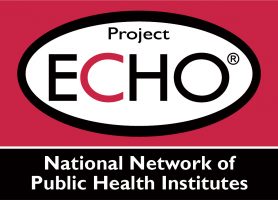Applying ECHO Public Health to Address Opioid Use Disorder During COVID-19
- By: Meghan Wolfe
- Date
At the intersection of health care and public health, opioid use disorder (OUD) as the focus of an ECHO Public Health series can make use of the traditional model while weaving in adaptations that make the learnings and applications relevant for a public health audience.
The Centers for Disease Control and Prevention (CDC), in partnership with the National Coordinating Center for Public Health Training (NCCPHT) at NNPHI, funded three opioid-related Project ECHOs in 2019 and 2020 with the University of New Mexico (UNM), the Center for Health Innovation (CHI), and the Illinois Public Health Institute (IPHI). The UNM series focused on prescribing practices of health care practitioners to develop alternatives to opioids for pain management. The CHI and IPHI series addressed stigma, communications strategies, and evidence-based best-practices to address OUD for governmental public health workers and direct service providers.
Lessons from Implementation
The Project ECHO model, which is well established in clinical spaces, is fairly new to public health. The two series that took place in New Mexico had a much easier time recruiting participants, as the ECHO model was founded in the state. In Illinois, potential participants were provided more information on the training model in addition to information about the topic and series curriculum. Brand recognition of the ECHO model in public health spaces is increasing, but more work is needed to articulate the benefits and uses of the ECHO model for public health.
Each of the ECHO series teams approached recruitment of participants differently, from broad outreach to targeted invitations to stakeholder input meetings. The CHI series focused on inviting teams of two participants (one direct service provider and one supervisor) from a series of organizations that address opioid use disorder in their community. Recruitment of these teams included personalized invitations, one-on-one meetings to describe the ECHO series and expectations, and sometimes additional follow up messages and meetings. Their hands-on approach paid off, and the CHI series experienced no attrition of participants over the course of six sessions. However, the team also reflected on power dynamics among teams, which sometimes influenced the openness of the conversation. These learnings demonstrate the value of considering creative recruitment tactics and participant dynamics to build out a successful ECHO series.
Case presentations are a core part of the ECHO model. They allow participants to share real challenges and seek advice and solutions from other participants and subject matter experts. They are also one of the most difficult pieces of the model to translate for a public health audience. Instead of focusing on a single patient chart as the case, public health practitioners are tackling population-level and systemic challenges that don’t fit as easily into the “case” template. Instead, ECHO Public Health focuses on sharing case experiences that includes describing a challenge and the ideal outcome and a discussion of various options to address the challenges and risks associated with each. Participants can then share similar experiences and how they addressed similar challenges. While the case experience model is a shift in thinking for many participants, it has also led to concrete discussions on topics like establishing trust in priority communities and systems level response coordination for complex patients who actively use substances like opioids.
Impact of the COVID-19 Pandemic
The global COVID-19 pandemic impacted the implementation of these ECHO series in some expected and unexpected ways. Staff faced challenges in recruiting participants who were involved with pandemic response activities at their agencies, while also dealing with the personal toll of the crisis on their families and communities. Another challenge was promoting a training series on a topic other than COVID-19, as many other public health initiatives were paused or scaled back due to the pandemic.
One more surprising outcome of COVID-19 was the rapid increase in familiarity and comfort with using virtual video platforms – one of the key elements of a Project ECHO series. Where in-depth overviews and technology check-ins may have been needed in the past, most public health practitioners are now intimately familiar with these platforms. We also found that some participants valued the ECHO community as a reprieve from pandemic response – a place where they could share experiences, failures, and learn together in a safe space. The value of community, even in virtual settings, cannot be understated as a key element of the ECHO series.
Next Steps for ECHO Public Health
This fall, the NCCPHT will launch a new ECHO series focused on operationalizing anti-racism and health equity principles in performance improvement in partnership with the Michigan Public Health Institute (MPHI). The series will be accepting participants from the Public Health Performance Improvement Network (phPIN), an online learning community for state, local, tribal, and territorial health department performance improvement practitioners. Sign up to receive ECHO updates and other NCCPHT training opportunities.
This project is supported by the Centers for Disease Control and Prevention of the U.S. Department of Health and Human Services (HHS) as part of a financial assistance award totaling $1,056,554 funded by CDC/HHS through a cooperative agreement with the National Network of Public Health Institutes (NNPHI) with 100% funded by CDC/HHS. The contents are those of the author(s) and do not necessarily represent the official views of, nor an endorsement, by NNPHI, CDC/HHS, or the U.S. Government.

 Subscribe To Our Communications
Subscribe To Our Communications